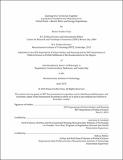Charting new territories together : laying the foundations for mutual gains in United States - Mexico water and energy negotiations
Author(s)
Verdini Trejo, Bruno
DownloadFull printable version (6.868Mb)
Alternative title
Laying the foundations for mutual gains in United States - Mexico water and energy negotiations
Other Contributors
Massachusetts Institute of Technology. Department of Political Science.
Advisor
Lawrence E. Susskind.
Terms of use
Metadata
Show full item recordAbstract
This research examines two landmark negotiations between the United States and Mexico. The first involves the conflict over the shared hydrocarbon reservoirs in the Gulf of Mexico. The second analyzes the dispute over the shared waters of the Colorado River. For over seventy years, pursuing unilateral development, the U.S. and Mexico alternated between deadlock and confrontation in both cases. However, they were able to buck this trend in 2012, reaching two agreements. For the first time, the two sides have established a binational framework through which to co-develop and jointly manage these transboundary natural resources, as partners. This research explores how the negotiators shaped these agreements, and in what ways they contributed to the resolution of these long-standing disputes. With interviews with over 70 negotiators in the U.S. and Mexico, including every one of the chief negotiators who had decision-making authority at the negotiating table, the dissertation argues that a critical factor in breaking the cycle of disputes to reach agreement was that both sides were able to shift from solely allocating costs to also allocating benefits. The two countries reinterpreted the broader political and economic circumstances surrounding the shared water and energy resources, influenced in part by drastic natural disasters and resource shortages. These events, in turn, modified the countries' alternatives, drew stakeholders to the negotiations with revised mandates, fostered new back table coalitions, and led to a reframing of beneficial trades that had not been obvious earlier. Changes in political leadership, especially in regard to the interpretation of and response to transboundary challenges, were additional enabling factors making this shift possible. By focusing on the negotiation process and the tension between creating and claiming value, the dissertation attempts to draw prescriptive negotiation and leadership advice that may be useful in other international resource management disputes, particularly between developing and developed countries. As such, it aims to highlight how stakeholders can move beyond hard-bargaining tactics and avoid the ultimatums that accompany the presumption that there are not enough resources to go around, and that one side must win and the other must inevitably lose.
Description
Thesis: Ph. D. in Negotiation, Communication, Diplomacy, and Leadership, Massachusetts Institute of Technology, Department of Urban Studies and Planning, 2015. This electronic version was submitted by the student author. The certified thesis is available in the Institute Archives and Special Collections. An interdisciplinary Ph. D. with the Department of Political Science, MIT. Cataloged from student-submitted PDF version of thesis. Includes bibliographical references (pages 303-320).
Date issued
2015Department
Massachusetts Institute of Technology. Department of Urban Studies and PlanningPublisher
Massachusetts Institute of Technology
Keywords
An interdisciplinary Ph. D. with the Political Science, MIT. Department of Urban Studies and Planning., Political Science.